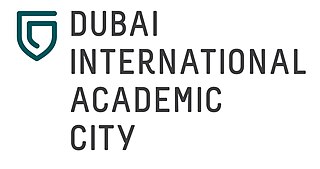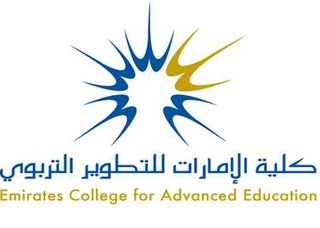The American University in Dubai (AUD) is a private for-profit university in Dubai, United Arab Emirates located in Dubai Media City. It was founded in 1995 and considered to be the first private university established in UAE, and serves UAE nationals and international students with an American-style education.

United Arab Emirates University (UAEU) (Arabic: جامعة الإمارات العربية المتحدة) is a public research university located in Al Ain, United Arab Emirates. Founded in 1976 by the country's first President, Sheikh Zayed bin Sultan Al Nahyan, it is the oldest university in the United Arab Emirates and offers courses in various subjects up to post-graduation.

American University of Sharjah is a private university in Sharjah, United Arab Emirates. It was founded in 1997 by Sultan bin Muhammad Al-Qasimi, Supreme Council Member and Ruler of Sharjah. Located in University City in Sharjah, AUS has more than 5,000 students from more than 94 countries and a full-time faculty of more than 360 from 48 countries.

The American International School, Abu Dhabi is a private international K-12 school offering an American curriculum. The college-preparatory IB Diploma Program (IBDP) is offered in grades 11 and 12, and the IB Primary Years Program (IBPYP) is offered from KG to Grade 5. The school is coeducational in elementary, and gender-segregated in secondary.

The University of Sharjah is an Emirati private national university located in University City, Sharjah, United Arab Emirates. It was established in October 1997 by its founder the ruler of Sharjah Sheikh Dr. Sultan bin Muhammad Al-Qasimi to meet the emirate of Sharjah's aim of educational needs. The university goals constitute of becoming a leading academic institution in the Middle East and around the world. In addition to its main campus in Sharjah City, the university has built campus facilities to provide education,training, and research programs directly to several communities throughout the emirate, GCC, Arab countries, and internationally. Most significantly, the university plays an important role in the socioeconomic development of the emirate of Sharjah.
Private education in Dubai is regulated by the Knowledge and Human Development Authority. The UAE Ministry of Education is responsible for public schools in Dubai. Currently, more than 90% of school education in Dubai takes place in the private sector, served by 194 private schools offering 17 different curricula to more than 280,000 students from 182 nationalities. Dubai has 26 international branch campuses of universities from 12 different countries - including the UK, Australia and India. More than 30,000 students attend these universities, with the majority studying business, engineering and media & design. The Knowledge and Human Development Authority (KHDA) was founded in 2006 to develop education and human resource sectors in Dubai, and license educational institutes.

The University of Wollongong in Dubai (UOWD) Arabic: جامعة ولونغونغ في دبي) is an offshore campus of the University of Wollongong in Dubai, United Arab Emirates. Established in 1993, the university is located in the Dubai Knowledge Park and serves over 3,500 students from more than 108 countries.

Abu Dhabi University (ADU) (Arabic: جامعة أبوظبي) is a private research university with its main campus in Khalifa City, Abu Dhabi, United Arab Emirates, and satellite campuses in Al Ain, Dubai and Madinat Zayed. Founded in 2003 by Ali Saeed bin Harmal al-Dhaheri, it is the largest private institution in the country that offers courses in various subjects up to post-graduation.

Al Ain University(AAU) (Arabic: جامعة العين), formerly the Al Ain University of Science and Technology, is a private university with its main campus in Al Ain, United Arab Emirates, and a satellite campus in Abu Dhabi. It was founded in 2004 by UAE's first President, Sheikh Zayed bin Sultan al-Nahyan.

Dubai International Academic City (DIAC), informally known as Academic City, is a university town in the city of Dubai, United Arab Emirates along the Dubai-Al Ain Road. The project was launched in May 2006 in liaison with Dubai Knowledge Park. The regulatory authority in the DIAC is the Dubai Development Authority.

Repton School Dubai, part of Excella, is an international, co-educational school founded in 2007. The school caters to students from ages 3 to 18 and has boarding facilities for students from age 11. It is a partner school of the original Repton School in the UK, founded in 1557.
ALHOSN University was an educational institution founded in 2005 and located in Abu Dhabi, the capital city of the United Arab Emirates. It is a segregated University with separate campuses for Male and Female Students. The Abu Dhabi-based university was accredited by the UAE Ministry of Higher Education and Scientific Research.

The Commission for Academic Accreditation (CAA) is the national quality assurance and regulatory agency responsible for evaluation and accreditation of higher educational institutions and universities in the United Arab Emirates. Established in 2000, it comes under the country's Ministry of Education.
The University of Dubai (UD) (Arabic: جامعة دبي) is an private university in Dubai, United Arab Emirates. Established in 1997, it is licensed nationally by the Ministry of Higher Education and Scientific Research. It became the first private University in Dubai to hold the AACSB international accreditation in 2009, maintaining for further 5 years till 2019, as well as the first private university in the UAE to hold the ABET-CAC accreditation for its Computing and Information Systems (BS) program in 2006. The curriculum is aligned with international professional certification bodies such as Institute of Leadership & Management (ILM)-UK, which awards BBA HRM and MBA Leadership and HRM graduates with level 5 and 7 certifications. Similarly, the curriculum is aligned with Islamic Economy, Smart City, Innovation and Entrepreneurship initiatives of the government with IBM partnership.

The Higher Colleges of Technology(HCT) (Arabic: كليّات التقنيّة العليا) is a public institute of technology with 16 campuses and facilities throughout the United Arab Emirates. Founded in 1988 by Sheikh Nahyan bin Mubarak al-Nahyan, it is the largest applied higher educational institution in the country.

The Abu Dhabi Department of Education and Knowledge(ADEK) (Arabic: دائرة التعليم والمعرفة), is the educational authority for the Emirate of Abu Dhabi, the largest emirate of the United Arab Emirates and the home of the country's capital city.

Emirates College for Advanced Education (ECAE) was officially established in 2007 and commenced teaching its first group of undergraduate students in September 2007 and its first group of postgraduate students in October 2007.
The College is a specialist teacher training college in the UAE. It was established to be a teacher preparation, educational research and school development centre and is funded by government to play a key role in the modernization of school education in the UAE and throughout the Middle East in collaboration with the Abu Dhabi Education Council (ADEC).

International Horizons College was an American curriculum institution located within the Business Bay area of Dubai City. It was founded in July 2011 with the aim of providing high-performing students with affordable and accessible higher education within the Middle East North Africa South Asia (MENASA) region. Accredited and licensed by the Commission for Academic Accreditation (CAA) of the United Arab Emirates Ministry of Higher Education and Scientific Research, the college was an independent and international institution, servicing the academic needs of the undergraduate student body.

Abu Dhabi International Private School is a private international school licensed by the Ministry of Education located in Abu Dhabi in the United Arab Emirates. The school offers an American curriculum, as well as the International General Certificate of Secondary Education (IGCSE) and the International Baccalaureate (IB) programs. It was founded in 1992 by current superintendent, Jihan Nasr.
















